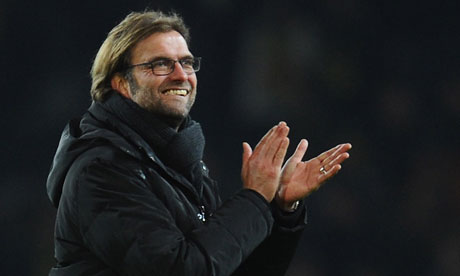
The Dortmund coach, Jürgen Klopp, 'lives and breathes football' and brings out the best in his young squad.
You don't need a degree in German to get the gist of the excitable headline in Wednesday's Bild proclaiming "Dortmund Wahrer Europa-Meister!" or to enjoy the jets of enthusiasm from Jürgen Klopp when he talks about his charming young Borussia Dortmund side. Taken literally, Bild's headline is premature – Dortmund are not "true European champions" yet. But the way they ran amok in a group containing the champions of England, Spain and Holland served notice. Their time is near.
Four wins, no defeats, and 14 points from Group D is impressive enough. Yet it might have been better still: only late goals at Manchester City and Real Madrid denied Dortmund a perfect six from six. Until recently their aim was merely to reach the knockout stages. Now the words are bolder, the ambitions greater.
"We are a very difficult team to play against and I'm sure teams aren't looking at us saying: we want to face them," Klopp admitted after the 1-0 win over City. Roberto Mancini concurred but went further, predicting: "This year I think they can win the Champions League." He was merely adding to a chorus led by Sir Alex Ferguson and José Mourinho, and joined by those who have seen Dortmund romp to successive Bundesliga titles.
So what is it about Klopp's side that makes people purr? Undoubtedly the ease on the eye of their football – which, while possession-based, is often as direct and uncompromising as a bullet. The willingness to maraud all over the pitch, hustling for possession. The transitions, not only from defence to attack, but from slow to fast. And the thrill of witnessing a youthful squad – the average age of the side that faced Bayern Munich last weekend was 23 – come of age.
It helps, of course, that the core of the squad that won the Bundesliga title as 25-1 underdogs in 2011 remains in situ – and of their star players, Robert Lewandowski is 24, Mats Hummels, Neven Subotic, Sven Bender and Marco Reus are all 23 and Mario Götze is 20. They have grown up together and they play for each other.
While City appeared to be going through the motions on Tuesday night – another day, another game – Dortmund played with a carefree sheen: as if football wasn't so much a day job as an activity they actually enjoyed. After the match, for instance, Hummels explained how excited he was to get Mario Balotelli's shirt, telling reporters: "He's a really cool guy, I really like him and I'm going to give his shirt to my brother for Christmas," while Moritz Leitner, a 19-year-old midfielder making his Champions League debut, said it "would be a dream come true" to test himself against Xavi, Andrés Iniesta and Leo Messi. In the press conference afterwards Klopp admitted he told Leitner to "be cheeky" on the pitch. How many other managers would have done the same thing?
Lewandowski, Dortmund's prolific striker, recently explained why Klopp was such an effective manager. "It depends on the situation but he knows when to laugh and when to work hard," he said. "He's very close with the team, gets along with all of us, which is very important. You can see on TV how happy he is when we score, and how mad he gets after a failed move.
"He lives and breathes football, the matches and training. He sees a lot. He is a good psychologist and that makes it easier for him to interact with the players. When he sees someone has a problem, he tries to solve it, and that's a great advantage for a coach."
Those warming words are matched with deeds from Dortmund's players. Klopp's men bust a gut for him and in return he seems to bring out the best in them. It is perhaps telling that Nuri Sahin and Shinji Kagawa have not shone as brightly away from his system.
Klopp has also proven to be tactically astute, softening Dortmund's high-tempo pressing game on occasion this season – perhaps realising that Dortmund can't relentlessly scavenge for the ball while playing three games a week – but also adding variety to his side's counterattacks. There is also perhaps an acceptance that they need to pick their battles in the Bundesliga to remain fresh for Europe, which perhaps goes some way to explain why Bayern Munich have galloped into a healthy lead.
After last year's failure in the Champions League, when Dortmund finished last in the group stage, Klopp also added a 4-3-3 formation to his armoury, giving his side a third defensive midfielder and accepting that against the very best teams a strong core is essential.
But that doesn't mean Dortmund's fundamental principles have altered. They are still a thrill to watch. And they are learning, building and tweaking all the time. Most of the squad have a decade at the top ahead of them. If they stay at Dortmund, who knows what the club might achieve.
No comments:
Post a Comment